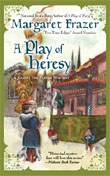CHAPTER 18
The household might seem to be waiting for them, but more likely they were all gathered in the kitchen and around the table only because they were just finishing the mid-day meal…
The origins of using a jury to determine guilt or innocence of a crime is rooted so far back in time that scholars write happy reams of speculation on not only when they began but on how they actually functioned. When matters become somewhat clearer in England around 1200, the problems do not smooth away, because the function and form of juries has proven to be an ongoing process, so that what was true in 1200 was not necessarily still accurate in the 1400s. But basically, the process of trial began with a jury of presentment. Their task was to determine who should be tried for whatever crime had been committed. The matter then went to the petty jury for full trial.
Mind – I said “basically”. Medieval English juries worked under many different principles than modern ones do, beginning with the fact that rather than being ignorant of the crime and suspect they were trying, medieval English jurors were expected to know about both and “in some cases the presenting jury may have been turned immediately into a trial jury…”1, guaranteeing they were well-acquainted with the case.
Moreover, besides what they were expected to find out for themselves, “Priming a jury with information … was quite in order. In personal actions the jurors’ names were supposedly given by the sheriff to the parties so they might supply them with information. . . [A] statute of 1427 suggests it had become the practice to supply it before the trial took place.”2 Nonetheless, “At the trial, hearsay was, indeed, taboo and judges must make sure that jurors did not rely upon it. Jurors must know the truth, and were sworn to tell it to the best of their knowledge. If, however, they did not know it or possessed imperfect knowledge they could not then support the prosecution, for they must not reach their verdicts on the basis of mere ‘thoughts’.”3 Outside witnesses could be brought in and, like the jurors, were expected to testify to what they knew, not on hearsay or opinion. “A jury which acquitted in defiance of reason was liable to punishment by the king. . . If the case was one of murder, the jurors, when they returned their verdict, might be asked by the justices who in fact was the guilty party if not the accused.”4 [My bold.]
Now there is a scene that would be great fun to write.
Through the 1300s there was a change toward having the petty jury consist increasingly of “members [who] had not served on the juries which presented the crime. The king was not at all pleased by this for he felt the chances of conviction were reduced. Maybe he believed that petty jurors who were meeting the case for the first time might, through their lack of knowledge about it, be lacking in sympathy for the party injured. Despite the increasing use of the testimony of witnesses [my bold] this fear may not have been unfounded. Nonetheless, in 1352 Edward III had to give in to popular pressure and agree that no indictor should be put on a petty jury if challenged by the accused.”5
I emphasize the “increasing use of the testimony of witnesses” to counterbalance a tendency in the more simple sources to undervalue the effort that juries were expected to put into finding correct verdicts. To quote from (gasp!) Wikipedia: “The source of juror knowledge could include first-hand knowledge, investigation, and less reliable sources such as rumor and hearsay” (citing Daniel Klerman, “Was the Jury Ever Self-Informing” Southern California Law Review 77: (2003), 123), which points up the kind of blanket statements that reduce medieval matters to a simplicity they rarely were in reality.
Of course, as with anything to do with the law, none of this was as simple as given here. There were all manner of nuances and complexities based on time and place and who was involved — and all of those shifted over the medieval centuries. I like lawyers but you won’t find me trying to write a book centered on one because I’ve done enough research to realize I have no business getting into the mass of complexities medieval law involves, for fear of the myriad pitfalls awaiting me!
– Margaret
Sources
1 Bellamy, John. Crime and Public Order in England in the Later Middle Ages. 1973. p.145
2 ibid. p.148
3 Pugh, Ralph B. “Some Reflections of a Medieval Criminologist”. Proceedings of the British Academy, vol. 59 (1973) p.98
4 Bellamy, John. Crime and Public Order in England in the Later Middle Ages. 1973. p.151
5 ibid. p.145
Follow the virtual bookclub for A Play of Heresy on Facebook and Twitter.
















